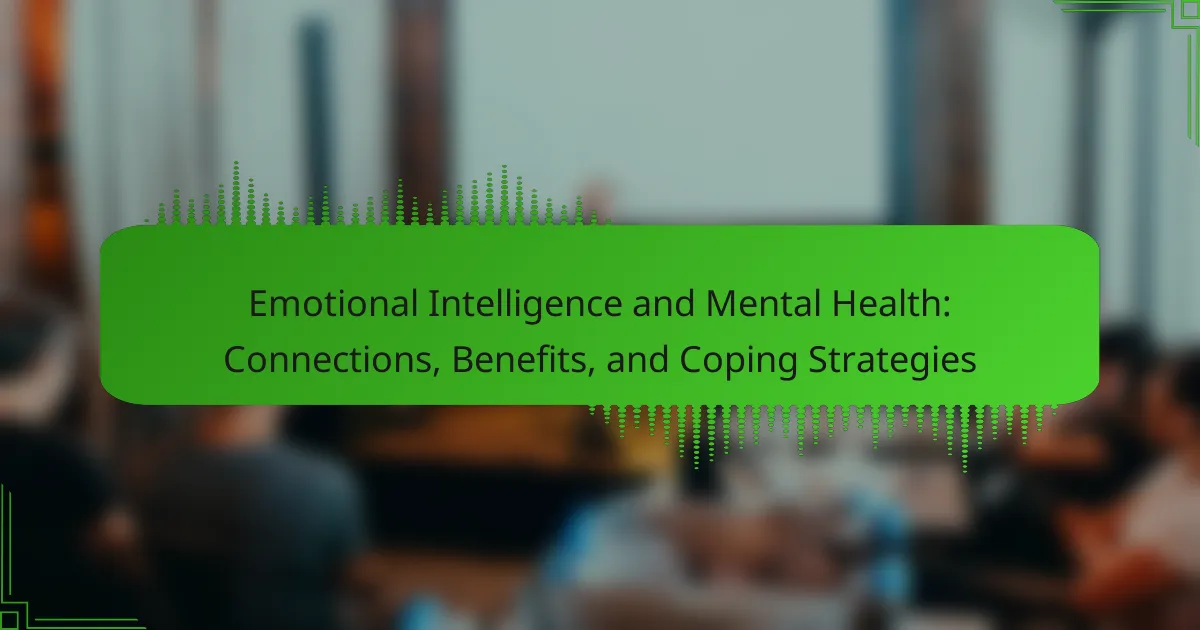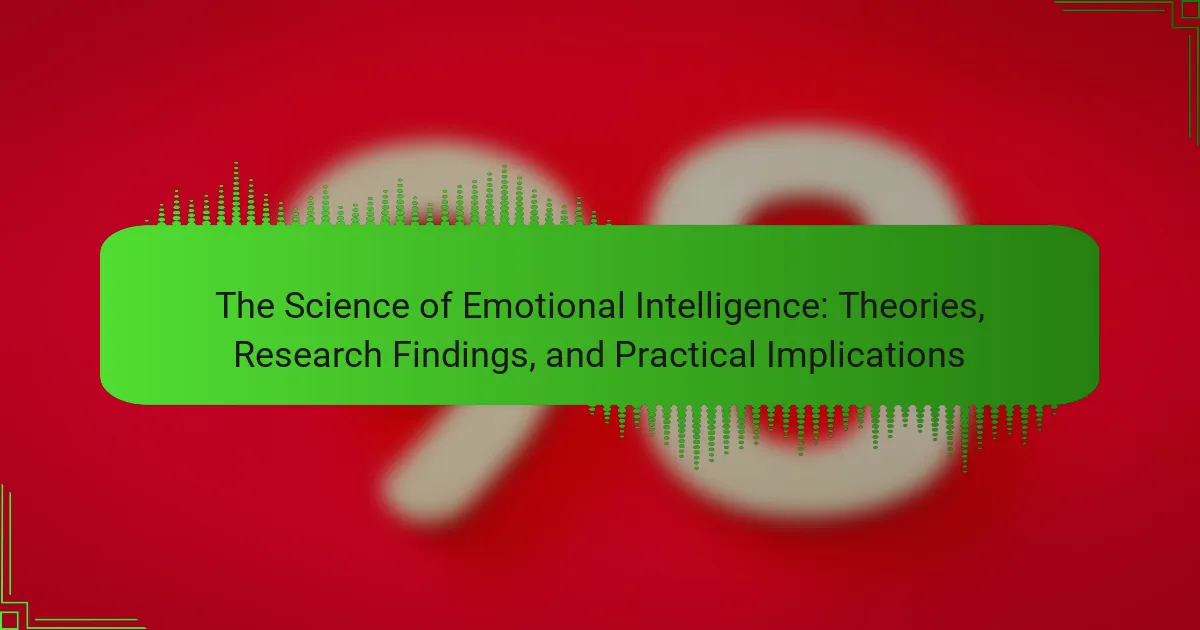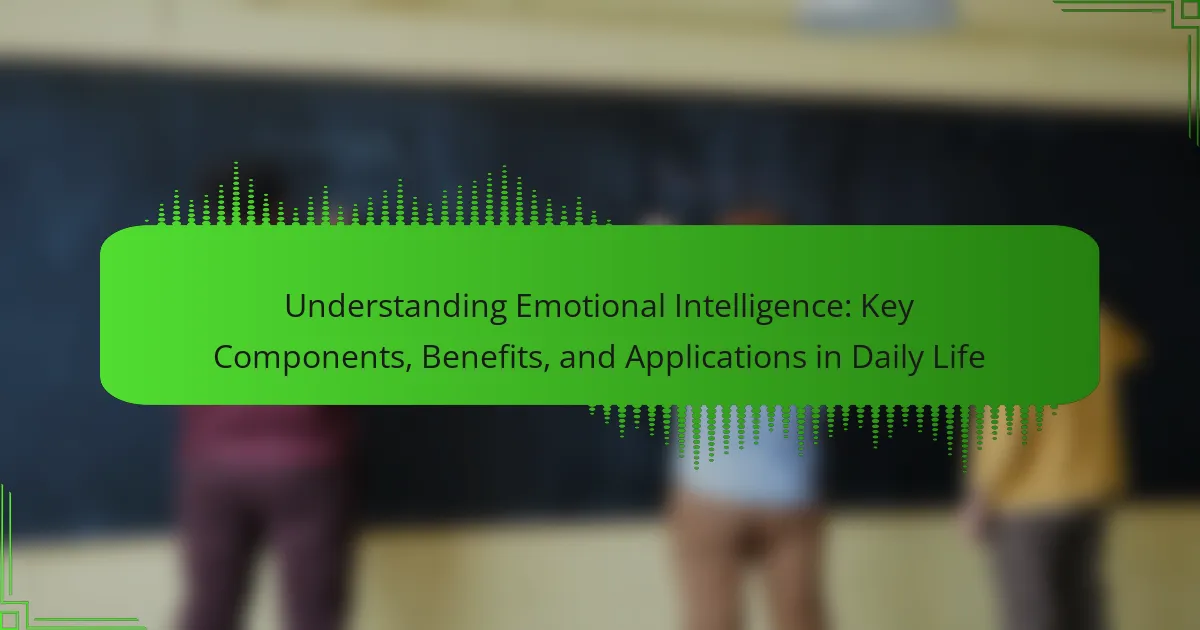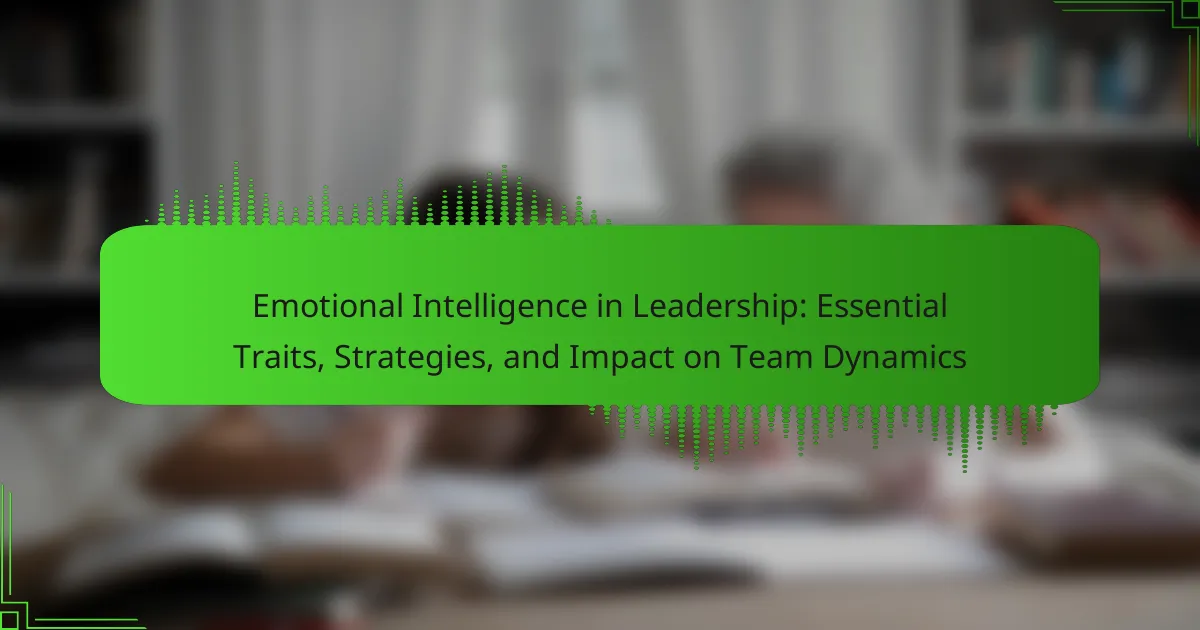Emotional intelligence (EI) is the ability to recognize, understand, and manage both personal and others’ emotions. This article explores the significant connections between EI and mental health, highlighting how high emotional intelligence contributes to better emotional regulation, interpersonal relationships, and stress management. Research indicates that individuals with higher EI experience lower levels of anxiety and depression, leading to improved psychological well-being. The article also discusses effective coping strategies derived from EI, such as self-awareness, emotional regulation, and empathy, which enhance communication and conflict resolution skills, ultimately fostering healthier relationships and promoting mental health.
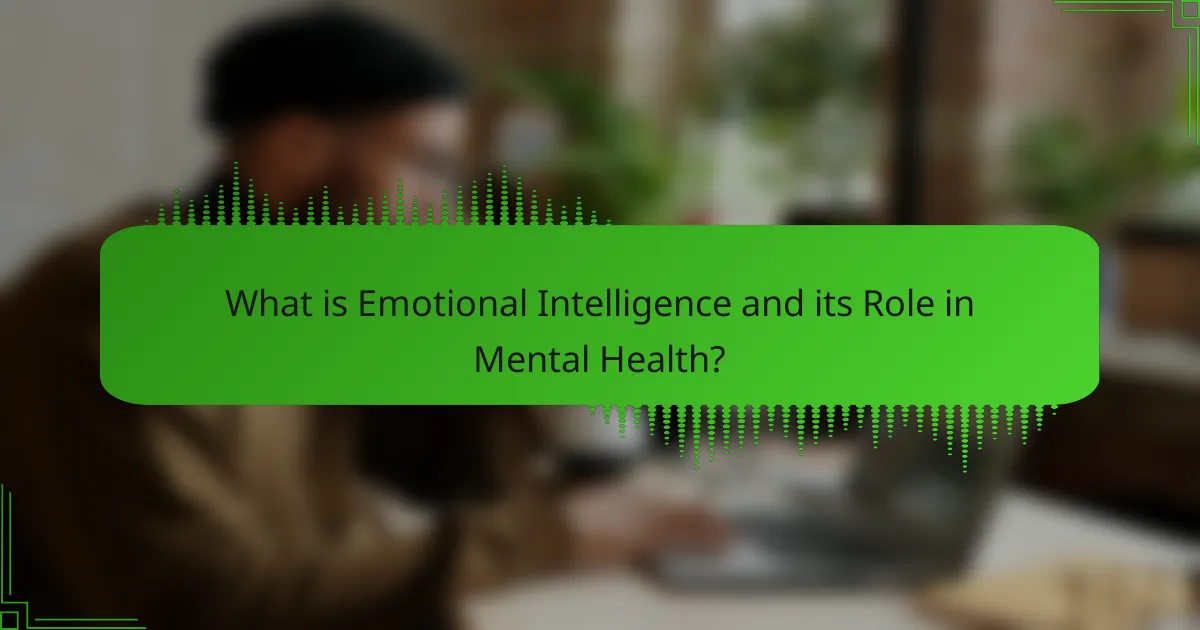
What is Emotional Intelligence and its Role in Mental Health?
Emotional intelligence (EI) is the ability to recognize, understand, and manage one’s own emotions and the emotions of others. It plays a significant role in mental health by influencing emotional regulation, interpersonal relationships, and stress management. High emotional intelligence can lead to better coping strategies in stressful situations. Studies show that individuals with higher EI experience lower levels of anxiety and depression. Additionally, EI contributes to improved communication and conflict resolution skills. This fosters healthier relationships, which are crucial for mental well-being. Research indicates that EI can predict mental health outcomes more accurately than traditional intelligence measures.
How does Emotional Intelligence influence mental health outcomes?
Emotional Intelligence (EI) significantly influences mental health outcomes. Higher levels of EI are associated with better emotional regulation. Individuals with strong EI can manage stress more effectively. They also exhibit improved interpersonal relationships. This leads to lower levels of anxiety and depression. Research shows that EI can predict psychological well-being. For instance, a study by Schutte et al. (2007) found that EI correlates with lower emotional distress. Thus, enhancing EI can serve as a protective factor for mental health.
What are the key components of Emotional Intelligence?
The key components of Emotional Intelligence are self-awareness, self-regulation, motivation, empathy, and social skills. Self-awareness involves recognizing one’s emotions and their impact on thoughts and behavior. Self-regulation refers to managing emotions and impulses effectively. Motivation includes the drive to pursue goals with energy and persistence. Empathy is the ability to understand and share the feelings of others. Social skills encompass the ability to build and maintain relationships. Research by Goleman (1995) emphasizes these components as crucial for effective emotional functioning and interpersonal interactions.
How do these components relate to mental health?
Emotional intelligence components relate to mental health by enhancing self-awareness, empathy, and emotional regulation. Higher emotional intelligence leads to better stress management. Individuals with strong emotional intelligence can identify and understand their emotions. This understanding fosters healthier relationships and reduces anxiety. Empathy allows individuals to connect with others, promoting social support. Research shows that emotional intelligence correlates with lower levels of depression. A study by Schutte et al. (2002) found that emotional intelligence can predict mental health outcomes. These components work together to improve overall psychological well-being.
Why is Emotional Intelligence important for mental well-being?
Emotional Intelligence (EI) is crucial for mental well-being because it enables individuals to recognize and manage their emotions effectively. High EI helps in understanding one’s feelings and the feelings of others. This understanding fosters better relationships and communication. Research indicates that individuals with high EI experience lower levels of anxiety and depression. According to a study published in the Journal of Happiness Studies, emotional intelligence correlates with higher life satisfaction. Enhanced EI can lead to improved coping strategies during stress. It empowers individuals to navigate social complexities and resolve conflicts more effectively. Overall, emotional intelligence plays a significant role in maintaining mental health and resilience.
What benefits does high Emotional Intelligence provide for individuals?
High Emotional Intelligence (EI) provides individuals with enhanced interpersonal skills. Individuals with high EI can better understand and manage their own emotions. This leads to improved communication and stronger relationships. They are also more adept at empathizing with others. This empathy fosters trust and collaboration in personal and professional settings. Research indicates that high EI is linked to better mental health outcomes. A study published in the Journal of Applied Psychology found that individuals with high EI experience lower levels of stress and anxiety. Additionally, high EI contributes to effective conflict resolution. Individuals can navigate disagreements without escalating tensions. Overall, high EI significantly enhances personal well-being and social interactions.
How does Emotional Intelligence help in managing stress and anxiety?
Emotional Intelligence (EI) helps in managing stress and anxiety by enhancing self-awareness and emotional regulation. Individuals with high EI can identify their emotions and understand their triggers. This awareness allows for better coping strategies during stressful situations. High EI also fosters empathy, enabling individuals to recognize and respond to the emotions of others. This can strengthen social support networks, which are crucial for stress management. Research shows that individuals with higher EI report lower levels of anxiety and stress. A study published in the Journal of Personality and Social Psychology found that EI is linked to better psychological well-being. This connection underscores the importance of EI in effectively managing stress and anxiety.
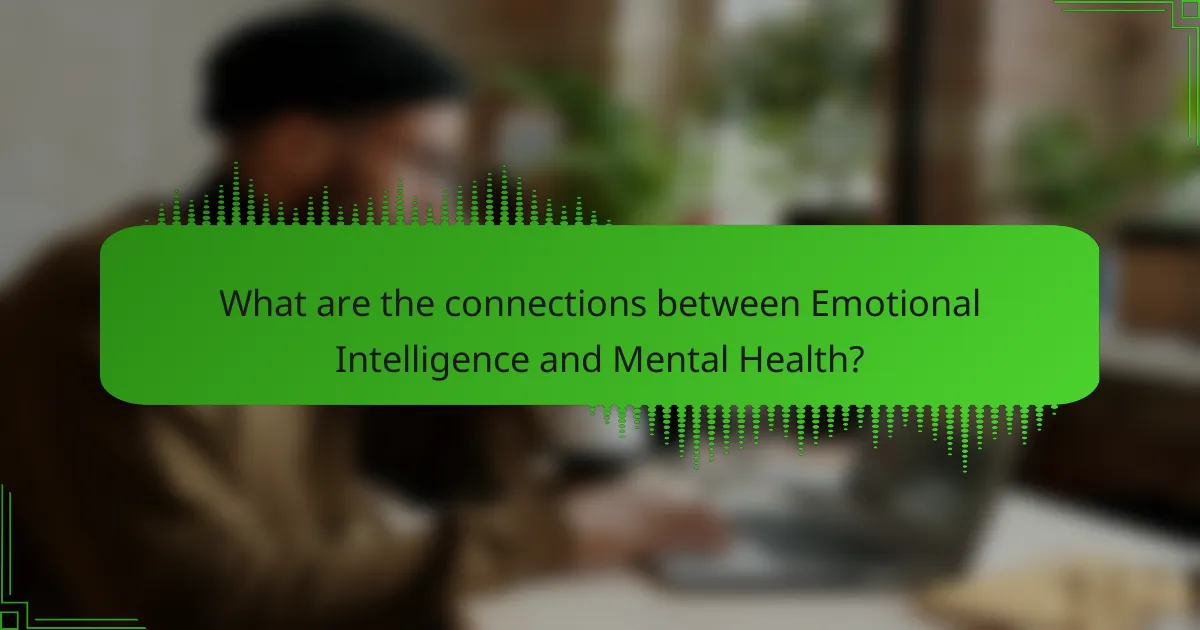
What are the connections between Emotional Intelligence and Mental Health?
Emotional intelligence (EI) significantly impacts mental health. High EI enables individuals to recognize and manage their emotions effectively. This skill leads to better stress management and resilience. Research shows that individuals with high EI experience lower levels of anxiety and depression. A study published in the “Journal of Happiness Studies” found a strong correlation between EI and overall psychological well-being. Additionally, EI fosters healthier relationships, which are crucial for mental health. Individuals with high EI are better at empathizing and communicating, reducing conflicts. Therefore, the connections between emotional intelligence and mental health are profound, influencing emotional regulation and interpersonal dynamics.
How do Emotional Intelligence and mental health interact?
Emotional intelligence significantly influences mental health. Individuals with high emotional intelligence can better manage stress and anxiety. They are more adept at recognizing and regulating their emotions. This regulation leads to improved coping strategies in challenging situations. Studies show that higher emotional intelligence correlates with lower levels of depression and anxiety. For instance, a study published in the Journal of Personality and Social Psychology found that emotional intelligence predicts better mental health outcomes. Therefore, enhancing emotional intelligence can serve as a protective factor for mental health.
What research supports the link between Emotional Intelligence and mental health?
Research indicates a strong link between Emotional Intelligence (EI) and mental health. High EI is associated with better emotional regulation and resilience. A study by Schutte et al. (2001) found that individuals with higher EI report lower levels of anxiety and depression. Another research by Martins et al. (2010) highlighted that EI contributes to improved coping strategies during stress. Additionally, a meta-analysis by Brackett et al. (2010) confirmed that EI positively influences mental well-being across various populations. These studies collectively support the assertion that higher EI correlates with enhanced mental health outcomes.
How can Emotional Intelligence impact relationships and social support?
Emotional intelligence significantly impacts relationships and social support. It enhances communication by enabling individuals to express their feelings clearly. High emotional intelligence fosters empathy, allowing people to understand others’ emotions better. This understanding strengthens interpersonal connections and builds trust. Individuals with strong emotional intelligence can manage conflicts more effectively. They are more likely to seek and provide support during difficult times. Research shows that emotionally intelligent individuals report higher relationship satisfaction. Studies indicate that emotional intelligence contributes to stronger social networks. This leads to improved mental health outcomes and resilience in facing challenges.
What role does Emotional Intelligence play in coping with mental health challenges?
Emotional Intelligence (EI) plays a crucial role in coping with mental health challenges. EI involves the ability to recognize, understand, and manage one’s emotions. Individuals with high EI can effectively navigate stress and anxiety. They are better equipped to identify emotional triggers and respond appropriately. This skill set enhances resilience during difficult times. Research indicates that higher EI correlates with lower levels of depression and anxiety. A study published in the Journal of Personality and Social Psychology found that individuals with higher EI reported better mental health outcomes. Thus, EI serves as a valuable tool for managing mental health challenges effectively.
How can individuals develop their Emotional Intelligence for better mental health?
Individuals can develop their Emotional Intelligence (EI) for better mental health through self-awareness, self-regulation, social skills, empathy, and motivation. Self-awareness involves recognizing one’s emotions and understanding their impact. This can be achieved through mindfulness practices, such as meditation, which have been shown to enhance emotional understanding. Self-regulation refers to managing emotions in healthy ways. Techniques like deep breathing can help in regulating emotional responses.
Social skills are vital for building relationships. Engaging in active listening and effective communication fosters better interpersonal connections. Empathy allows individuals to understand others’ emotions, which can be cultivated by putting oneself in another’s shoes. Motivation involves setting personal goals and maintaining a positive attitude, which can improve resilience.
Research indicates that higher EI is linked to lower levels of anxiety and depression (Mayer, Salovey, & Caruso, 2004). Developing EI can thus lead to improved mental health outcomes.
What strategies can enhance Emotional Intelligence in daily life?
Practicing self-awareness enhances Emotional Intelligence in daily life. Self-awareness involves recognizing one’s emotions and their impact on behavior. Journaling can help individuals track their emotional responses. Mindfulness meditation also increases self-awareness by promoting presence in the moment.
Developing empathy is another effective strategy. Empathy involves understanding and sharing the feelings of others. Active listening fosters empathy by encouraging individuals to fully engage in conversations. Asking open-ended questions can deepen understanding of others’ perspectives.
Improving emotional regulation is crucial for enhancing Emotional Intelligence. This involves managing one’s emotions in various situations. Techniques such as deep breathing or cognitive reframing can help individuals respond more effectively to emotional challenges.
Building strong relationships contributes to higher Emotional Intelligence. Positive social interactions provide opportunities for practicing emotional skills. Networking and participating in group activities can strengthen interpersonal connections.
Seeking feedback from others can also enhance Emotional Intelligence. Constructive criticism helps individuals identify areas for improvement. Regularly asking for feedback encourages personal growth and emotional awareness.
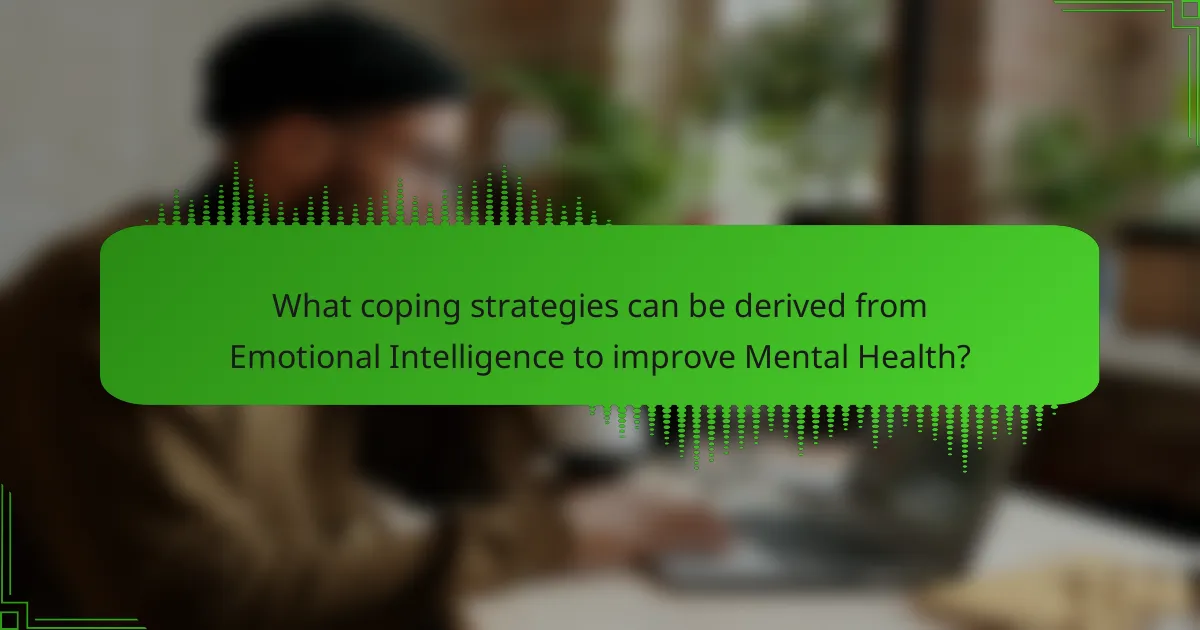
What coping strategies can be derived from Emotional Intelligence to improve Mental Health?
Coping strategies derived from Emotional Intelligence (EI) can significantly improve Mental Health. These strategies include self-awareness, which helps individuals recognize their emotions and triggers. By understanding their feelings, individuals can respond to stressors more effectively. Another strategy is emotional regulation, allowing individuals to manage their emotional responses to challenging situations. This can reduce anxiety and promote resilience.
Empathy is also a key component of EI. It enables individuals to connect with others, fostering supportive relationships that can buffer against mental health issues. Additionally, social skills derived from EI facilitate effective communication and conflict resolution, which can alleviate stress and enhance social support networks.
Research indicates that individuals with higher EI report better mental health outcomes. A study published in the Journal of Happiness Studies found a strong correlation between EI and lower levels of depression and anxiety. Thus, utilizing these EI-based coping strategies can lead to improved mental well-being.
How can Emotional Intelligence inform effective coping strategies?
Emotional Intelligence (EI) enhances effective coping strategies by improving self-awareness and emotional regulation. Individuals with high EI can identify their emotions and understand their triggers. This awareness allows them to respond to stressors more adaptively. For instance, they may use problem-solving techniques rather than avoidance behaviors. Research indicates that EI correlates with better stress management and resilience. A study by Schutte et al. (2002) found that higher EI is linked to lower levels of anxiety and depression. Therefore, EI equips individuals with tools to navigate challenges effectively.
What are specific coping strategies that utilize Emotional Intelligence?
Specific coping strategies that utilize Emotional Intelligence include self-awareness, emotional regulation, empathy, and social skills. Self-awareness involves recognizing one’s own emotions and their impact on thoughts and behavior. This understanding allows individuals to respond more effectively to stressors. Emotional regulation refers to the ability to manage and respond to emotional experiences in a healthy manner. This skill helps in reducing anxiety and improving overall mental health.
Empathy enables individuals to understand and share the feelings of others. This can foster supportive relationships that provide comfort during difficult times. Social skills, such as effective communication and conflict resolution, enhance interpersonal interactions. These skills are crucial for building strong support networks, which are essential for coping with stress.
Research indicates that individuals with high Emotional Intelligence tend to employ these strategies more effectively. A study published in the Journal of Emotional Intelligence found that these coping mechanisms significantly correlate with lower levels of stress and improved mental health outcomes. This evidence supports the effectiveness of Emotional Intelligence in enhancing coping strategies.
How can mindfulness and self-regulation be integrated into coping strategies?
Mindfulness and self-regulation can be integrated into coping strategies through structured practices. Mindfulness involves being present and aware of thoughts and feelings without judgment. Self-regulation refers to the ability to manage emotions and behaviors in response to stressors. Together, they enhance emotional awareness and control.
Practicing mindfulness can reduce stress and improve focus. Techniques include meditation, deep breathing, and body scans. These practices help individuals observe their thoughts and feelings. This observation fosters a non-reactive state, aiding in emotional regulation.
Self-regulation techniques complement mindfulness by providing tools to manage responses. Strategies include setting goals, identifying triggers, and developing coping plans. These techniques allow individuals to respond thoughtfully rather than react impulsively.
Research supports this integration. A study by Brown et al. (2015) found that mindfulness training improved self-regulation and coping skills among participants. This evidence highlights the effectiveness of combining mindfulness with self-regulation in coping strategies.
What practical tips can enhance Emotional Intelligence for better mental health?
Practicing self-awareness can enhance Emotional Intelligence for better mental health. Self-awareness involves recognizing your emotions and their impact on your thoughts and behavior. Journaling your feelings daily can improve this skill. Regular reflection on experiences helps identify emotional triggers.
Developing empathy is another practical tip. Empathy means understanding others’ feelings and perspectives. Engaging in active listening promotes empathy. This involves fully concentrating on the speaker and responding thoughtfully.
Managing stress effectively is also crucial. Techniques such as mindfulness and deep breathing can reduce emotional reactivity. Research shows that mindfulness can lower anxiety levels and improve emotional regulation.
Building social skills enhances Emotional Intelligence as well. Strong interpersonal relationships contribute to better mental health. Joining community groups or participating in team activities fosters these skills.
Finally, practicing emotional regulation is essential. This means managing your emotional responses to situations. Techniques include cognitive reappraisal, which helps reframe negative thoughts. Studies indicate that individuals who regulate their emotions effectively experience lower levels of depression.
How can individuals practice empathy and active listening?
Individuals can practice empathy and active listening by fully engaging with others during conversations. This involves maintaining eye contact and using open body language. They should avoid interrupting and allow the speaker to express their thoughts completely. Reflecting on what the speaker says helps to clarify understanding. Asking open-ended questions encourages deeper dialogue. Summarizing the speaker’s points shows that they are being heard. Empathy can be enhanced by putting oneself in the other person’s shoes. Research indicates that active listening improves relationships and emotional connection, fostering a supportive environment.
What daily exercises can help improve Emotional Intelligence skills?
Daily exercises to improve Emotional Intelligence skills include practicing mindfulness meditation, engaging in active listening, and journaling about emotions. Mindfulness meditation enhances self-awareness and emotional regulation. Active listening fosters empathy and understanding in interactions. Journaling helps reflect on emotional responses and patterns. Research shows that these practices can significantly increase emotional intelligence over time. Regular engagement in these exercises can lead to better emotional awareness and interpersonal relationships.
Emotional intelligence (EI) is defined as the ability to recognize, understand, and manage both personal and others’ emotions, playing a crucial role in mental health. The article explores the significant connections between EI and mental health outcomes, highlighting how higher EI correlates with better emotional regulation, reduced anxiety and depression, and improved interpersonal relationships. Key components of EI, such as self-awareness, empathy, and social skills, are discussed alongside strategies for developing EI to enhance mental well-being. Additionally, the article outlines practical coping strategies derived from EI that can effectively manage stress and foster resilience.
